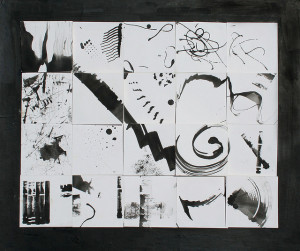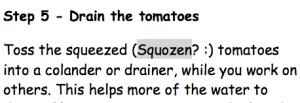
Sometimes chaos is better… CC image Order from Chaos by lokate366. Some rights reserved.
I’ve been struggling with this blog since the turn of the year. Which is why I haven’t been able to post anything here, until today.
Of course the end-of-year holidays provided their own source of distraction and time commitment. On top of that, however, a much bigger concern has been looming over my head with regard to what I’m writing and sending out into the world via this wee forum.
For the first time ever, I think, I took the changing of the year as a springboard to look over my work and creative crises. What I saw did not fill me with glee — but then, I’m not known for being particularly kind to myself. Recognizing this, I decided to take the opportunity to re-set in the new year with a fresh outlook and retooled goals.
The fresh outlook and goals covers every category of my life, including this blog. I had an idea of what I wanted to say when I launched it, and this past year I’ve felt more and more confused about my message. What story was I telling, after all?
Like a lot of people who start blogs and then go freelance, I had grandiose ideas at first. Alas, the ideas were a hodgepodge of themes, and so I found myself facing the same questions over and over each time I went to post content, only they got louder and in a bigger typeface each time:
- Does this fit with my overall theme?
- Wait — what IS the overall theme? There are at least two.
- No, three.
- If so, it’ll definitely fit. Because it hits at least one of the themes. Right?
- …Won’t this just look like a bigger mess as I go along?
The crux of the matter was my obstinate attempt to be practical and useful with my blog. To be Above it All, and Wise. Except whenever I sat down to write, I found myself sinuously winding along a whimsical, playful, sometimes painful personal creative vein.
I didn’t share all of that. Because it didn’t fit. And partly because sharing is hard (with deference to Havi here).
And my inner self wasn’t letting me get away with it. My inner self threw creative tantrums.
More and more, I wanted to talk about thoughts and ideas and inspirational nuggets and dream-babies of mine that had NO OBVIOUS PRACTICAL PURPOSE.
That’s right! About Art with a capital A!
Shocking. Downright provocative. I know — a blog about creativity and art that was — playing with creativity and art?
Say it ain’t so.
Truth: I need to find harmony with myself, and I need to find honesty with myself also. I’m simply not getting anywhere cutting out a part of myself and pretending it doesn’t exist. I signed up for a Voice & Speech class at the start of the year, which is known to be a place where people become blubbering emotive puddles, and I became a blubbering emotive puddle during THE FIRST CLASS, trying to say this out loud.
I can be practical. I can be. Just like I can be organized. Periodically. And I can be logical. In a crisis, when you need a cool head, that’s me.
The fact is, though, that my personality test results tell me I’m intuitive, feeling, and perceiving. Did I need a personality test for this? I am a stereotype. Everybody knows this about me. I am a sensory being, putting on intellectual armor over my creations before I sally forth.
I’m tired of trying to make this blog fit some preconceived mold. I’m not 100% sure what it’s going to look like, but I know what it’s NOT going to look like. It’s definitely NOT going to look like a thesis outline. More like a paint splatter. Because the point of creativity, writing and art is that they are FUN. And gosh darn it, I’m going to have fun talking about them here.*
Do you have fun stuff? Share in the comments!
== == ==
*Because I am nothing if not ambitious, I might be pursuing the more “serious” ideas in a more “serious” forum. No promises.





